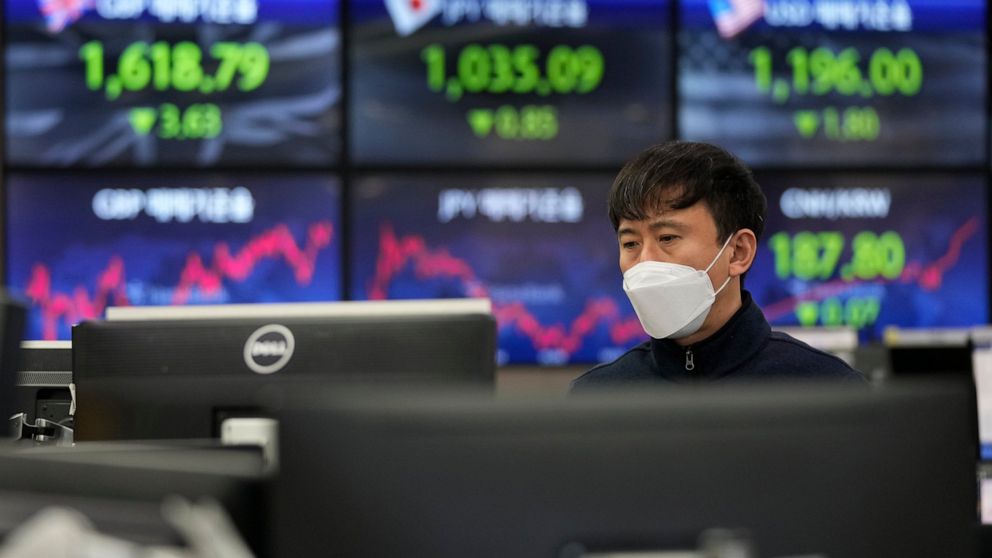Asian shares mostly higher after Wall Street tech rally
TOKYO — Asian shares mostly rose Thursday as investors tried to gauge U.S. inflation, tensions between Russia and Ukraine and the impact of the pandemic.
Japan’s benchmark Nikkei 225 rose 0.4% to 27,687.53 in afternoon trading. Australia’s S&P/ASX 200 gained 0.3% to 7,288.50. South Korea’s Kospi added 0.1% to 2,772.18. Hong Kong’s Hang Seng edged down 0.2% to 24,788.82, while the Shanghai Composite declined 0.2% to 3,474.80.
Wall Street will get another update Thursday on rising prices when the Labor Department releases its report on inflation for January. Economists are forecasting that consumer prices rose 7.3%, a four-decade high.
“Equity futures are also looking positive for both U.S. and Asian stock markets at present ahead of the U.S. January CPI release tonight,” said Robert Carnell, regional head of research, Asia-Pacific, at ING in a report, referring to the report on consumer prices expected later in the day.
Japan extended measures in Tokyo and some other places to curb outbreaks of the coronavirus for three weeks, until March 6, to try to bring the spread of the omicron variant under control.
The restrictions, mostly requests to restaurants and bars to close early, had been scheduled to end on Sunday. Prime Minister Fumio Kishida’s decision follows requests from governors in areas where daily infection cases are overwhelming hospitals.
Although more than 80% of the Japanese population have received two COVID vaccine shots, only about 7% have gotten boosters.
Also on market players’ minds is how Russia has massed over 100,000 troops near Ukraine’s border, prompting protests from the U.S., Europe and other allies. Western nations say they will impose their toughest-ever sanctions on Russian businesses and individuals if Moscow invades Ukraine.
Britain’s top diplomat flew Wednesday to Moscow, seeking to defuse tensions raised by Russia’s military buildup near Ukraine and warning that an invasion would bring “massive consequences for all involved.”
Technology companies led a broad rally on Wall Street. The S&P 500 rose 1.5% to 4,587.18. The Dow Jones Industrial Average gained 0.9% to 35,768.06 and the tech-heavy Nasdaq composite rose 2.1%, to 14,490.37.
Small company stocks also notched gains. The Russell 2000 rose 1.9% to 2,083.50.
More than 85% of stocks in the S&P 500 gained ground, with technology and communications stocks powering much of the gains. Microsoft rose 2.2% and Google’s parent company, Alphabet, rose 1.6%.
Bond yields were mixed.
The yield on the 10-year Treasury fell to 1.92% on Thursday, down from 1.95%, the highest it’s been since before the pandemic began.
Investors are focusing on company earnings reports as they try to gauge how Corporate America is dealing with higher inflation and persistent global supply chain disruptions.
Of the roughly 60% of S&P 500 companies that have reported results for the last three months of 2021, about 62% delivered earnings and revenue that topped Wall Street’s forecasts, according to S&P Global Market Intelligence.
Taco Bell owner Yum Brands rose 2.2% after reporting strong fourth-quarter revenue. Freight transportation company XPO Logistics rose 8.3% after also reporting solid financial results.
The Walt Disney Co. and Uber rose in after-hours trading after each reported results that topped Wall Street’s estimates.
Drugstore chain CVS fell 5.4% for the biggest decline in the S&P 500 after giving investors a discouraging earnings forecast.
“Earnings and sales really have come in overall quite nicely relative to expectations at the beginning of this quarter, so that’s a positive force within the market,” said Lisa Erickson, senior market strategist at U.S. Bank Wealth Management.
Twitter and Coca-Cola report their results on Thursday.
An unexpectedly smaller rise in prices in Thursday’s data release could signal inflation easing and could support markets, though a bigger increase would weigh on stocks since it would up pressure on the Federal Reserve to move more quickly to raise interest rates to fight inflation.
In energy trading, benchmark U.S. crude fell 24 cents to $89.42 a barrel in electronic trading on the New York Mercantile Exchange. It rose 30 cents to $89.66 per barrel. Brent crude, the international standard, slipped 36 cents to $91.19 a barrel.
In currency trading, the U.S. dollar rose to 115.63 Japanese yen from 115.52 yen. The euro cost $1.1434, up from $1.1427.
![]()


